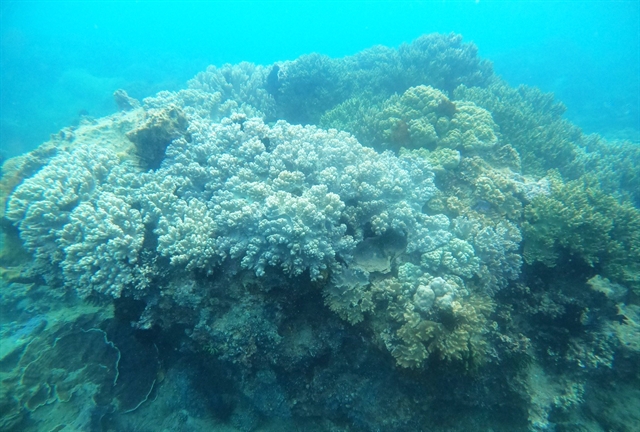 Environment
Environment

In a bid to protect coral reefs and marine ecosystems, authorities in Bình Định Province, last year, set aside four areas of coral reefs to be managed by local organisations and communities.

|
| A view of coral reefs along coastal areas of Bình Định Province. — VNA/VNS Photo Tường Quân |
BÌNH ĐỊNH — In a bid to protect coral reefs and marine ecosystems, authorities in Bình Định Province, last year, set aside four areas of coral reefs to be managed by local organisations and communities.
Climate change, over development, and seafood exploitation are threatening the life of coral reefs in a number of coastal areas in the province.
Dứa Beach in Nhơn Lý Commune, for example, is well known for its diverse and distinct coral reefs. It covers a total area of over eight hectares, however, only one hectare is strictly protected by local authorities due to a lack of resources.
To ensure the remaining seven hectares are protected from damage caused by fishing vessels and tourists, and to raise public awareness of the threats coral reefs face among the local community, the Quy Nhơn City’s People’s Committee, last February, decided to hand over management of the area to the Group of Seafood Resources Protection (GSRP), a local community group.
Members went to work almost straight away and zoned off the areas with coral reefs by installing buoys to monitor and alert fishermen and tourists of their location so that they are able to avoid making contact.
Nguyễn Việt Xuân, a member of the group, said the group also regularly organises patrols to educate people on how to interact with the coral reefs safely and avoid damaging the fragile ecosystem. This includes not stepping on or collecting coral to take home and not throwing rubbish into the sea.
Furthermore, the group has banned fishermen from using explosives to catch fish in areas with coral reefs, he said, and regularly organises patrol in these areas to ensure the ban is enforce.
Vice chairman of Nhơn Lý Commune’s People’s Committee Nguyễn Thành Danh, said the group members’ activities have helped to raise people’s awareness of dangers facing the maritime ecosystem and the coral reefs and how to better protect them.
“Over the past year, the coral reefs in Dứa Beach have developed well thanks to the group’s protection. We hope the city’s authorities will continue to authorise the local community to manage and protect the coral reefs,” he said.
The city’s People’s Committee has done just that.
The GSRP, in conjunction with Nhơn Châu Island Commune, has been entrusted to manage and protect 12ha of coral reefs in the west of Hòn Khô island and a 20ha area of coral reefs near Tước beach.
Nguyễn Tôn Xuân Sáng, a member of the GSRP, said a number of proactive steps have already been taken to ensure the protection of the area.
Buoys have been planted and vessels have been banned from exploiting fisheries in this area in order to protect the coral reefs and allow aquatic resources to breed and regenerate.
When the coral reefs are better protected, it will help to attract more tourists, Sáng said.
Apart from supporting these groups to protect the coral reefs, local officials are also regularly monitoring the health of the marine ecosystem by utilising local communities who are most familiar with the areas.
Nguyễn Hải Bình, vice chairwoman of the Seafood Association of Bình Định Province, local people assigned to protect the coral reefs know how the coral reefs in their areas are developing.
Coral reef ecosystems are a habitat for marine species, and help keep marine ecosystems in balance. They provide habitats and food for fish and their destruction may lead to the extinction of some species, scientists have warned.
The Bình Định Fisheries Association, in 2018, introduced a project titled "Management and conservation of coral reef ecosystems associated with ecotourism development in Nhơn Hải Commune” to help raise awareness of the threats posed to coral reefs. It encourages local communities to become involved in their protection and promotes sustainable ecotourism to ensure coral reefs can be enjoyed long into the future. — VNS




